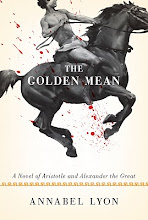To hear my interview with Kari Moran for KFWB Los Angeles on Sunday, October 3rd at 3:00PM Pacific time, please click here and then click Listen Live.
Thursday, September 30, 2010
Love Those Libraries
On Monday, October 4 at 7:00PM, I'll be reading at the Central Branch of the Vancouver Public Library, in the Alma VanDusen Room. Then on Tuesday, October 5 at 7:00PM, I'll be reading at the Richmond Public Library at the Brighouse Performance Hall. Both events are free and open to the public.
The Guardian Top 10
"Annabel Lyon's top 10 books on the ancient world: From Plato to John Updike and Robert Graves to Sappho, the novelist chooses books that 'subvert, surprise, challenge and please'."
To read my full list for The Guardian, please click here.
To read my full list for The Guardian, please click here.
Tuesday, September 28, 2010
Hello Bellingham!
 On Wednesday, September 29 at 7:00PM I'll be reading at Village Books in Bellingham, Washington. For more information, please click here.
On Wednesday, September 29 at 7:00PM I'll be reading at Village Books in Bellingham, Washington. For more information, please click here.
Sunday, September 26, 2010
Hello Seattle!
 On Tuesday, September 28 at 7:00PM, I'll be reading at Seattle's Elliott Bay Book Company. For more information, please click here.
On Tuesday, September 28 at 7:00PM, I'll be reading at Seattle's Elliott Bay Book Company. For more information, please click here.
Boston Globe Review
 "[H]ere we have a novel that is brave enough to raise the universal questions about how a man should live his life; that describes with amazing authority the flaws and growth of one of our greatest philosophers as well as his famous student, who, literally, seems to “swallow the world” before his death at age 32; and that, with luck, may send some of us back to the original texts that still shine with so much intelligence and wisdom."
"[H]ere we have a novel that is brave enough to raise the universal questions about how a man should live his life; that describes with amazing authority the flaws and growth of one of our greatest philosophers as well as his famous student, who, literally, seems to “swallow the world” before his death at age 32; and that, with luck, may send some of us back to the original texts that still shine with so much intelligence and wisdom."To read Roberta Silman's full review for the Boston Globe, please click here.
Saturday, September 25, 2010
Reading at Douglas College
 On Monday, September 27th at 2:00PM, I'll be reading from The Golden Mean at Douglas College, Room 3406, New Westminster campus. This event is free and open to the public. For more information, please click here.
On Monday, September 27th at 2:00PM, I'll be reading from The Golden Mean at Douglas College, Room 3406, New Westminster campus. This event is free and open to the public. For more information, please click here.
Tuesday, September 21, 2010
Monday, September 20, 2010
Rhymes With Aristotle
The opening lines of "The Holy Office", a 1904 poem by James Joyce:
Myself unto myself will give
This name, Katharsis-Purgative.
I, who dishevelled ways forsook
To hold the poets’ grammar-book,
Bringing to tavern and to brothel
The mind of witty Aristotle,
Lest bards in the attempt should err
Must here be my interpreter:
Wherefore receive now from my lip
Peripatetic scholarship....
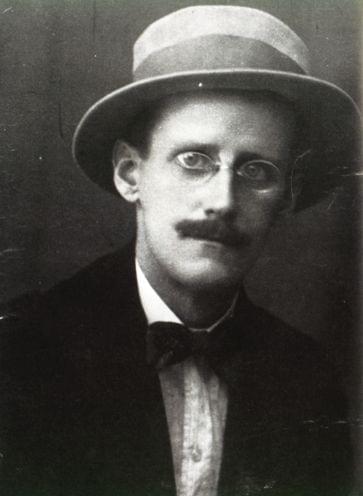
Myself unto myself will give
This name, Katharsis-Purgative.
I, who dishevelled ways forsook
To hold the poets’ grammar-book,
Bringing to tavern and to brothel
The mind of witty Aristotle,
Lest bards in the attempt should err
Must here be my interpreter:
Wherefore receive now from my lip
Peripatetic scholarship....

Sunday, September 19, 2010
Word of the Day
 The Greek term "eudaimonia" is occasionally translated as "happiness", though a more Aristotelian understanding of the term would be "human flourishing", or a complete human life. In Upheavals of Thought: The Intelligence of Emotions, the American scholar Martha Nussbaum points out that in English the word has tended to associate the supreme good with happiness or pleasure, whereas the ancient Greek concept is "compatible with as many distinct conceptions of what that good is as one cares to propose". Further, "A conception of eudaimonia is taken to be inclusive of all to which the agent ascribes intrinsic value: if one can show someone that she has omitted something without which she would not think her life complete, then that is a sufficient argument for the addition of the item in question" (32-33).
The Greek term "eudaimonia" is occasionally translated as "happiness", though a more Aristotelian understanding of the term would be "human flourishing", or a complete human life. In Upheavals of Thought: The Intelligence of Emotions, the American scholar Martha Nussbaum points out that in English the word has tended to associate the supreme good with happiness or pleasure, whereas the ancient Greek concept is "compatible with as many distinct conceptions of what that good is as one cares to propose". Further, "A conception of eudaimonia is taken to be inclusive of all to which the agent ascribes intrinsic value: if one can show someone that she has omitted something without which she would not think her life complete, then that is a sufficient argument for the addition of the item in question" (32-33).According to Wikipedia, "A moral theory which links virtue (arete) and happiness (eudaimonia) specifying the relation between these two concepts is one of the central preoccupations of ancient ethics, and a subject of much disagreement. As a result there are many varieties of eudaimonism. Two of the most influential forms are those of Aristotle[1] and the Stoics. Aristotle takes virtue and its exercise to be the most important constituent in eudaimonia but does acknowledge the importance of external goods such as health, wealth, and beauty. By contrast, the Stoics make virtue necessary and sufficient for eudaimonia and thus deny the necessity of external goods."
This image is of Eros and Eudaimonia.
Saturday, September 18, 2010
Ancient Tombs Discovered Near Pella
 According to Yahoo!, Greek archeologists have uncovered 37 tombs dating back to the iron age near the ancient city of Pella. "The tombs contain iron swords, spears and daggers, plus vases, pottery and jewellery made of gold, silver and iron." This bronze helmet and gold mouth protector were amongst the finds. To read the full article, please click here.
According to Yahoo!, Greek archeologists have uncovered 37 tombs dating back to the iron age near the ancient city of Pella. "The tombs contain iron swords, spears and daggers, plus vases, pottery and jewellery made of gold, silver and iron." This bronze helmet and gold mouth protector were amongst the finds. To read the full article, please click here.
Tuesday, September 14, 2010
Robson Reading Series
 On Thursday, September 16 at 7:00PM, it's my privilege to be taking part in the Robson Reading Series with Naomi Beth Wakan (Book Ends: A Year Between The Covers). Free admission! Refreshments! Book purchase and signing! For more information, please click here.
On Thursday, September 16 at 7:00PM, it's my privilege to be taking part in the Robson Reading Series with Naomi Beth Wakan (Book Ends: A Year Between The Covers). Free admission! Refreshments! Book purchase and signing! For more information, please click here.
Sunday, September 12, 2010
Dream Team
Does anyone else do this? Sometimes when I get stuck writing, I imagine my book is a movie and cast it; then I imagine creating the character for the particular actor I've chosen. My dream team for The Golden Mean :
Aristotle: David Thewlis
Pythias: Sarah Polley
Herpyllis: Catherine Keener
Philip: John Malkovich
Olympias: Julianne Moore or Zoe Wannamaker
Callisthenes: Gael Garcia Bernal
Carolus: Christopher Plummer
Alexander: hmmm....

Aristotle: David Thewlis
Pythias: Sarah Polley
Herpyllis: Catherine Keener
Philip: John Malkovich
Olympias: Julianne Moore or Zoe Wannamaker
Callisthenes: Gael Garcia Bernal
Carolus: Christopher Plummer
Alexander: hmmm....

Saturday, September 11, 2010
The Scotsman - Review
"This is an outstanding novel, admirably structured, economical and evocative, keenly intelligent, amusing and sad – a book in which imagination and intellect are yoked in harmony."
To read Allan Massie's full review for The Scotsman, please click here.

To read Allan Massie's full review for The Scotsman, please click here.

Hot in Kentucky
 Under the headline What's Hot: The Golden Mean: "Lyon draws the curtain back on the smoke-filled huts and palace chambers that shaped the lives of these two great men, whose mutual admiration and intellect transformed civilization. It's historical fiction at its finest."
Under the headline What's Hot: The Golden Mean: "Lyon draws the curtain back on the smoke-filled huts and palace chambers that shaped the lives of these two great men, whose mutual admiration and intellect transformed civilization. It's historical fiction at its finest."To read Juliet Disparte's review in the Louisville Courier-Journal, please click here.
Wednesday, September 8, 2010
Largehearted Boy: Book Notes
 "The music I returned to again and again while writing the novel (with one or two blessed exceptions) tended to reflect back the harshness and fear and loneliness I was writing about. Bleak beauty; vibrant darkness. And a bit of Beach Boys."
"The music I returned to again and again while writing the novel (with one or two blessed exceptions) tended to reflect back the harshness and fear and loneliness I was writing about. Bleak beauty; vibrant darkness. And a bit of Beach Boys."I'm thrilled to have contributed a playlist to the website Largehearted Boy, which features authors and the music they listen to. Mine includes Yo-Yo Ma, The Clash, Melismos, and more. To read the whole article, please click here.
The Kalash
The Kalash are an indigenous people of the Hindu Kush mountain range, possibly descendants of Alexander the Great's army (though some geneticists dispute this). They speak a language distantly related to Greek and practice a polytheistic religion that to this day involves seasonal festivals celebrating the three main gods protecting the herds--Sorizan, Goshidai, and Balimain--and animal sacrifice, particularly of goats.

Kalash customs differ drastically from those of the Muslim population surrounding them: men and women mix freely, women don't cover their faces, marriage by elopement is common, and women can change husbands if the new husband is willing to pay twice the dowry of the old one. Girls and women are sequestered during menstruation and childbirth, however, until they regain their "purity".
According to Wikipedia, the Kalash population stands at about 6000 and UNESCO considers the Kalasha language critically endangered.

Kalash customs differ drastically from those of the Muslim population surrounding them: men and women mix freely, women don't cover their faces, marriage by elopement is common, and women can change husbands if the new husband is willing to pay twice the dowry of the old one. Girls and women are sequestered during menstruation and childbirth, however, until they regain their "purity".
According to Wikipedia, the Kalash population stands at about 6000 and UNESCO considers the Kalasha language critically endangered.
Booklist Review
 "Ancient Greece, in all its gusto, gore, and glory, springs vividly to life in Lyon's pitch-perfect paean to Aristotle and Alexander the Great."
"Ancient Greece, in all its gusto, gore, and glory, springs vividly to life in Lyon's pitch-perfect paean to Aristotle and Alexander the Great."To read Margaret Flanagan's full review for the American Library's Association's trade magazine Booklist, subscribers can check back on September 15th and click here.
Tuesday, September 7, 2010
The Golden Mean in India
 "The best books are not necessarily those with dazzling prose or mind-numbing theories. The best books are those that steal up on you, and lead you gently into a world made real, not by an abundance of detail, but by honestly rendered characters that, from the very first page, so completely captivate that before you know it, you’ve read half the book and there are but a few hours until dawn. That is, the best books understand the allure – our insatisfiable longing to compare and contrast our minds with others – of interesting characters. Annabel Lyon’s The Golden Mean is such a book, and her accomplishment – the surprising irresistibility of her story – is all the more incredible when you consider that she’s chosen to focus on rather prosaic moments in a great man’s life."
"The best books are not necessarily those with dazzling prose or mind-numbing theories. The best books are those that steal up on you, and lead you gently into a world made real, not by an abundance of detail, but by honestly rendered characters that, from the very first page, so completely captivate that before you know it, you’ve read half the book and there are but a few hours until dawn. That is, the best books understand the allure – our insatisfiable longing to compare and contrast our minds with others – of interesting characters. Annabel Lyon’s The Golden Mean is such a book, and her accomplishment – the surprising irresistibility of her story – is all the more incredible when you consider that she’s chosen to focus on rather prosaic moments in a great man’s life."To find a link to Devon Shepherd's lovely review on indiatimes.com, please click here.
Monday, September 6, 2010
Welcome, US Readers!
 The Golden Mean is now available in the United States from Knopf. Welcome, American readers! Please check back from time to time for information on my upcoming readings (including at the Elliott Bay Book Company in Seattle, Village Books in Bellingham, and the Wordstock Festival in Portland) as well as information on the writing of the novel, research tidbits, and more.
The Golden Mean is now available in the United States from Knopf. Welcome, American readers! Please check back from time to time for information on my upcoming readings (including at the Elliott Bay Book Company in Seattle, Village Books in Bellingham, and the Wordstock Festival in Portland) as well as information on the writing of the novel, research tidbits, and more.
The Thinking Woman's Crumpet?
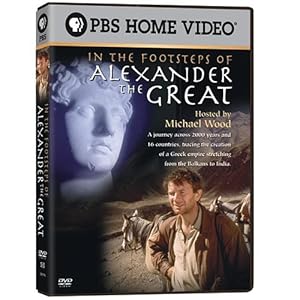 In 1997, the boyish English historian Michael Wood, dubbed the "thinking woman's crumpet" by the British media, made a TV documentary called In the Footsteps of Alexander the Great. (There's an accompanying book by the same name). I'm not sure about the crumpet part, but the four-part series is a fascinating recreation of Alexander's epic Eastward journey, from Macedonia to Persia, Egypt, Babylon, Afghanistan, India, and part-way home. Wood wades chest-deep through the sea to get around rocky headlands where Alexander's troops would have done the same, chats with locals as though Alexander passed through the day before yesterday, compares ancient and modern military maps, and encounters in country after country variations on the rumour that Alexander had horns (and killed all his barbers to keep the secret). Utterly entertaining and not hard to find (I borrowed it from the Vancouver Public Library).
In 1997, the boyish English historian Michael Wood, dubbed the "thinking woman's crumpet" by the British media, made a TV documentary called In the Footsteps of Alexander the Great. (There's an accompanying book by the same name). I'm not sure about the crumpet part, but the four-part series is a fascinating recreation of Alexander's epic Eastward journey, from Macedonia to Persia, Egypt, Babylon, Afghanistan, India, and part-way home. Wood wades chest-deep through the sea to get around rocky headlands where Alexander's troops would have done the same, chats with locals as though Alexander passed through the day before yesterday, compares ancient and modern military maps, and encounters in country after country variations on the rumour that Alexander had horns (and killed all his barbers to keep the secret). Utterly entertaining and not hard to find (I borrowed it from the Vancouver Public Library).
Better Book Titles: The Golden Mean
 The honour, the honour! Dan Wilbur gives The Golden Mean the "better book title" treatment. You can visit the whole site by clicking here.
The honour, the honour! Dan Wilbur gives The Golden Mean the "better book title" treatment. You can visit the whole site by clicking here.
Saturday, September 4, 2010
Aristotle's Lantern
Aristotle must have been an avid marine biologist; his History of Animals includes numerous descriptions of fish and shellfish, including the urchin, whose digestive system has become known as Aristotle's Lantern after this passage:
"…the urchin has what we mainly call its head and mouth down below,and a place for the issue of the residuum up above. The urchin has, also, five hollow teeth inside, and in the middle of these teeth a fleshy substance serving the office of a tongue. Next to this comes the esophagus, and then the stomach, divided into five parts, and filled with excretion, all the five parts uniting at the anal vent, where the shell is perforated for an outlet... In reality the mouth-apparatus of the urchin is continuous from one end to the other, but to outward appearance it is not so, but looks like a horn lantern with the panes of horn left out." (Aristotle, History of Animals, Tr. D'Arcy Thompson, courtesy of Wikipedia).
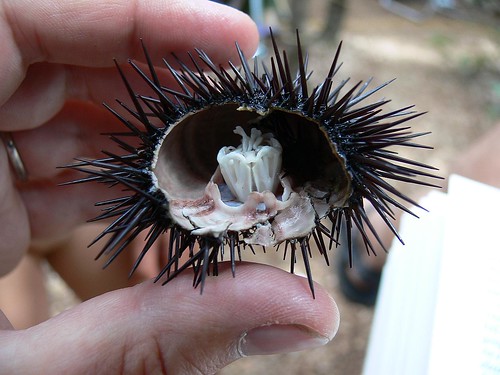
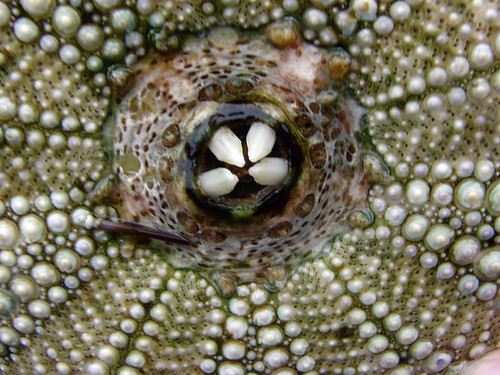
"…the urchin has what we mainly call its head and mouth down below,and a place for the issue of the residuum up above. The urchin has, also, five hollow teeth inside, and in the middle of these teeth a fleshy substance serving the office of a tongue. Next to this comes the esophagus, and then the stomach, divided into five parts, and filled with excretion, all the five parts uniting at the anal vent, where the shell is perforated for an outlet... In reality the mouth-apparatus of the urchin is continuous from one end to the other, but to outward appearance it is not so, but looks like a horn lantern with the panes of horn left out." (Aristotle, History of Animals, Tr. D'Arcy Thompson, courtesy of Wikipedia).


Friday, September 3, 2010
Guardian Review
"The 4th century BC and the youth of Alexander the Great are marvellously reimagined in Lyon's justifiably garlanded novel. Aristotle returns from Athens at the request of Philip II to Macedonia, where he becomes tutor to the king's son Alexander, presented here as a hotheaded, inquisitive young prince already showing signs of the limitless ambition and tactical genius that would make him one of the greatest empire-builders in history. The daily intrigues of the court, the visceral aspects of battle, philosophical discussion and Aristotle's household are all evoked in measured, burnished prose, which combines thrilling immediacy with a stately timelessness. Aristotle's black moods and Alexander's probable latent psychosis in particular are fascinatingly drawn."
To read Catherine Taylor's full article for The Guardian, please click here.
To read Catherine Taylor's full article for The Guardian, please click here.
Yorkshire Evening Post Review
 "With her sensuous prose, rich imagery and meticulous attention to detail, Lyon has brushed the cobwebs of ages from two of history's most charismatic characters and brought them gloriously to life."
"With her sensuous prose, rich imagery and meticulous attention to detail, Lyon has brushed the cobwebs of ages from two of history's most charismatic characters and brought them gloriously to life."To read Robert Colbeck's full review of The Golden Mean for the Yorkshire Evening Post, please click here.
Thursday, September 2, 2010
More US Reviews
"Lyon hits all the notes, from elegant to funky, to immerse us in places so foreign and so distant in time".
To read John McFarland's full review for Shelf Awareness, please click here.
"An intelligent and carefully written novel, I would recommend The Golden Mean and look forward to future works by Annabel Lyon."
To read Mary Simmon's full review for BookPleasures.com, please click here.
To read John McFarland's full review for Shelf Awareness, please click here.
"An intelligent and carefully written novel, I would recommend The Golden Mean and look forward to future works by Annabel Lyon."
To read Mary Simmon's full review for BookPleasures.com, please click here.
Amazon.com Best of the Month
 I'm so pleased that The Golden Mean has made Amazon.com's Best of the Month list for September 2010. For more information, please click here.
I'm so pleased that The Golden Mean has made Amazon.com's Best of the Month list for September 2010. For more information, please click here.
Wednesday, September 1, 2010
Kirkus Starred Review
"As authoritative and compelling as Mary Renault’s renowned novels set in the ancient world. One hopes we may learn more about Lyon’s immeasurably brilliant, unflappably human Aristotle."
 If you are an online subscriber to Kirkus Reviews, you can read the full review of The Golden Mean by clicking here.
If you are an online subscriber to Kirkus Reviews, you can read the full review of The Golden Mean by clicking here.
 If you are an online subscriber to Kirkus Reviews, you can read the full review of The Golden Mean by clicking here.
If you are an online subscriber to Kirkus Reviews, you can read the full review of The Golden Mean by clicking here.
Subscribe to:
Comments (Atom)

